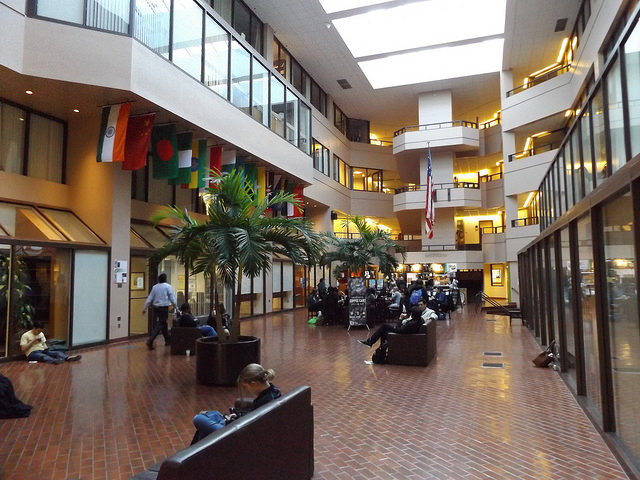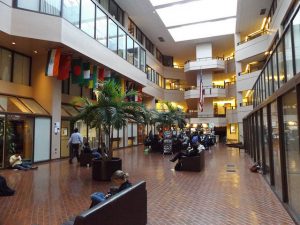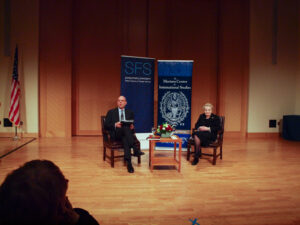Starting in fall 2016, Georgetown students will have access to new language programs, with the opening of foreign language minors to SFS students as well as the creation of a Johns Hopkins-Georgetown partnership set to widen the options available for the study of languages on campus.
The new language minors are the first of their kind for SFS students, who previously have had only the option of interdisciplinary “Certificates” to supplement their chosen major. According to Anna Hernick (SFS ’16), president of the SFS Academic Council, SFS students will be able to take the same courses and have the same requirements as language minors in the College. SFS students must still fulfill the proficiency requirement, which includes an oral exam to demonstrate competence in a modern foreign language. SFS students must continue taking language courses until they have passed the exam, but many stop taking courses once they have fulfilled the basic requirement. Hernick says the language departments are hoping to see higher enrollment and possibly greater variety in upper-level language courses.
Professor Daniel Byman, Senior Associate Dean for Undergraduate Affairs, wrote in an email to the Voice that minors have not been implemented before this point because SFS administrators believed the high number of course requirements already allowed for depth in interdisciplinary studies.
“There was a sense that minors were not necessary,” wrote Byman. “Students [already] must take history, economics, political science, and so on—so they don’t need to be exposed to another way of thinking. However, students made the case that minors would enrich their studies and make them more marketable professionally. Students drove the process.”
Hernick agreed that student feedback and petition were important catalysts for the implementation of the minors. Students expressed a need for an easy way to show their mastery of a specific discipline, along with the major on their diploma.
“It was definitely a student-driven initiative,” Hernick said. “We [the Academic Council] were able to complete a few surveys of the SFS student body that provided really strong justification for why there should be a serious discussion [about minors].”
Hernick and Byman both commented that allowing foreign language minors was a clear starting point for the new program in the SFS, as foreign languages are an important component of the SFS curriculum’s international foundations and interdisciplinary nature.
In addition to the language minors in the SFS, Georgetown is rolling out a new agreement for the wider student population with Johns Hopkins School of Advanced International Studies (SAIS) allowing a small number of students from both campuses to take languages courses at the other.
According to the March 21 SFS Globe, a weekly update from the SFS dean’s office, up to 25 Georgetown SFS, College, or Graduate School of Arts and Sciences students will be able to enroll in SAIS Burmese, Hindi/Urdu, Indonesian, Thai, or Vietnamese courses. Courses will count towards a student’s degree credits at Georgetown, but not factor into their GPA.
Jeff Connor-Linton, Associate Professor in the Department of Linguistics and Senior Associate Dean of Faculty and Strategic Planning for Georgetown College, helped broker the agreement with Johns Hopkins.
“The collaboration with SAIS will extend Georgetown students’ language learning opportunities,” wrote Connor-Linton in an email to the Voice. “[It will also] bring new [SAIS] students into some of Georgetown’s ‘smaller’ language courses—a win-win proposition!”
While Georgetown offers more than 20 languages, some students have found it severely lacking in terms of South Asian language representation.
Bhavya Jha (SFS ‘17), president of Georgetown’s South Asian Society (SAS), wrote in an email to the Voice that the SAIS partnership is a good step toward remedying this situation, although she hopes that the programs will be open to more students in the future.
“When I came to Georgetown as a freshman, there was barely any conversation about South Asian languages and regional classes,” wrote Jha. “I’m definitely glad to see the changes coming about slowly but surely.”
Asha Thanki (SFS ‘17), Public Relations Director of SAS, agreed that the partnership was an exciting opportunity, but thought that Georgetown should not stop there.
“Looking ahead, we still want to see further integration of South Asian languages into Georgetown academics,” wrote Thanki in an email to the Voice. “We’d like to see these languages taught directly on Georgetown’s undergraduate campus and these grades counting toward students’ GPAs.”
Hernick and Byman noted that students are generally happy with Georgetown’s strong language program, but were also the driving force behind the ongoing discussions that culminated in the new changes.
“Georgetown’s language offerings are a jewel, among the strongest of any university in America,” wrote Byman. “We can always offer more, but students have an array of language riches before them.”
With the new course offerings, Georgetown students should be able to access an expanded and diversified language program to supplement and enhance their studies.






